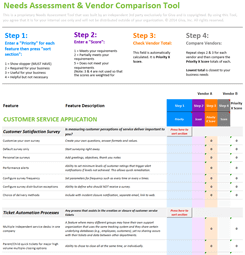BPO vs. Call Center: The Differences and How to Choose the Right One
Business Process Outsourcing (BPO) and Call Centers are two of the most common outsourcing options for many mid-size and enterprise organizations.
Many people, including C-Suite leaders, think these are the same thing, but they're actually quite different.
Knowing the differences between BPO and Call Centers is important when deciding which areas of operation are lacking in your business. Both can help you save money and serve customers better. However, both BPOs and Call Centers work in different ways and offer different kinds of services.
In this article, we compare and contrast them, and help you decide whether a Call Center or BPO vendor is needed to support in-house operations.

What is a BPO?
A Business Process Outsourcing (BPO) company takes care of entire business operational areas, services, and divisions for other companies. Think of it like hiring an outsourced team to handle large sections of your business operations.
BPO is a big market, currently worth $415.73 billion. According to recent statistics, "it's expected to show a steady annual growth rate (CAGR 2025-2030) of 3.39%, resulting in a market volume of $491.15bn by 2030."
BPO companies don't just answer phones - they can manage your accounting, handle your hiring, process orders, manage inventory, and much more.
Some of the largest BPO providers include, but aren't limited to the following:
- Accenture
- IBM
- Wipro
- Cognizant
- TCS
- Capgemini
- Genpact
- Alorica
- HGS
Although there are many other smaller and mid-size players in this market. A lot of these either have teams and operations in-country, and numerous other operations off-shore, and near-shore, in countries and regions like the Philippines, Indonesia, India, Southeast Asia, Central and Eastern Europe (CEE), Israel, Mexico, and Latin America.
BPO teams operate like an in-house department within your business, although usually more cost-effectively than an in-house team. A BPO can handle anything from HR and payroll, to social media marketing, process insurance claims, or even help with software and product development. BPO providers have experts in many different areas, and they generally use the latest technology, including AI copilots to get work done more efficiently.
What makes a BPO useful and value-added is that these companies become real business partners. BPOs learn about your company goals and help you achieve them. They use advanced computer systems, AI, and data analysis to make your business run smoother, and more cost-effectively.
BPO relationships usually last for years because these companies become a key part of how your business operates. They work closely with your internal teams and adapt as your organization grows and changes.
What is a Call Center?
A call center has trained agents who answer customer questions, help solve problems, take orders, and make sales calls. Call centers are much more focused, handling Live Chat, messages, phone calls, emails, and every form of customer communication.
Call center outsourcing is a large sector as well: "The global call center market revenue was worth $27.1 billion in 2022 and was projected to hit $55.5 billion by 2029", according to Unity Connect.
Modern call centers are complete Customer Experience (CX) operational centers, and also go under the name of "customer success."
Call center agents are specialists at talking to customers. They know how to handle angry customers, answer technical questions, and generate sales leads. Agents use cloud-based phone systems and customer service software to track calls, KPIs, SLAs, and help customers quickly and efficiently.
Call centers can be located anywhere: in your own building, in another city, or even in another country. These days, many are completely virtual, with agents working from home. The overall goal is always the same with any contact center: provide great customer service and keep customers happy.
Is There a BPO and Call Center Overlap?
It can get confusing when BPO providers also offer call center and customer experience (CX) operations. There is an unavoidable overlap in this sector. And the same can be said of IT Service Management (ITSM), ITIL, and DevOps, as BPO providers also offer these services.
However, there are also vendors that only focus on one area or another. That's why not all BPOs will offer call center services.
Now, let's compare and contrast the different ways that BPOs and call centers are different.
7 Ways BPOs and Call Centers Are Different
-
What They Do
Scope is the biggest difference. BPO companies handle numerous different business tasks, like:
- Accounting
- Human resources (HR)
- Data processing
- Marketing
- Even software development and IT
Call centers focus mainly on customer communication - answering calls, emails, and live chats.
-
How They Work With Your Business
BPO companies are integral, outsourced business partners. Because of the various roles they play, BPO managers often get involved in planning and strategy. Call centers are specialized service providers that focus on one area; customer service.
-
Technology They Use
BPO companies use numerous types of software that connect different parts of your operations to their systems. They might use accounting software, inventory systems, and data analysis tools. On the other hand, call centers use phone systems, chat software, and customer tracking programs.
-
Types of Workers
BPO companies need people with different skills, like accountants, marketers, data analysts, and project managers. Call centers mainly need people who are great at customer service and communication.
-
Cost and Investment
BPO services usually cost more up front, but can save you money across your entire business over time. Call centers have more predictable costs based on how many calls they handle and how many agents are needed.
-
How Success is Measured
BPO success is measured by how well your entire business runs, for example:
- Are processes faster?
- Are costs lower?
- Is revenue higher?
On the other hand, call centers are measured by customer satisfaction, how fast they answer calls, and how well they solve problems.
-
Flexibility
BPO companies can help with many different business areas and adjust as your needs change. Call centers are flexible mainly with the number of agents and communication channels they handle.
Comparison Table: BPO vs Call Center
Here's a quick reference of the differences between BPOs and Call Centers:
Area |
BPO |
Call Center |
Primary Goal |
Manage and look after mulitple business operational processes and systems |
Handle customer communication |
Roles |
Accounting, HR, marketing, data processing, software development, DevOps, ITSM, etc. |
Phone calls, emails, chat support |
Role in Business |
Business partner |
Service provider |
Technology |
Business software and analytics |
Phone and chat systems |
Staff Skills |
Many different experts, specialist skills, and skills levels |
Customer service specialists |
Contract Length |
Long-term partnerships |
Short to medium-term |
Cost Type |
Higher upfront costs, but saves money long-term |
Predictable monthly costs |
Growth Ability |
Can grow in many business areas |
Can add more agents and channels |
Now, the question is: Which is the right approach for your organization?
Which Should Your Business Choose: BPO or Call Center?
The right choice depends on a number of factors, including operational needs, in-house resources (and the cost-effectiveness and other factors surrounding an outsourcing decision), budgets, and business goals.
-
Choose a BPO when:
- You want help with either specific operational areas, or numerous functions, not just customer service
- You want your own team to focus on real added value and growth while other teams handle more necessary but not metric-moving functions
- You're looking to outsource one or more operational areas to a long-term business partner
- You need help with specialized tasks like accounting, HR, or data analysis
- You want to save operating finances across your whole organization
- It's cheaper and easier to outsource innovation and improve operations than try and do it in-house.
-
Choose Call Centers when:
- Your main goal is improved customer service
- You want to keep control of other business operations
- You have seasonal fluctuations when you need extra customer service help, and don't want to increase headcount at every seasonal uptick
- You need fully-trained agents and turnkey solutions for CX
- You want to start quickly without a big investment
- Your budget is focused on customer-facing operations
BPO and Call Center Pros and Cons to Consider
Here is another quick way to view choosing a BPO or call center according to advantages and disadvantages of each:
Aspect |
BPO Pros |
BPO Cons |
Call Center Pros |
Call Center Cons |
Scope |
Handles many functions |
Complex setup |
Easy to deploy quickly |
Narrow focus |
Cost |
Reduces long-term costs |
High upfront investment |
Predictable monthly cost |
May require scaling as volume grows |
Expertise |
Access to specialists |
Harder to manage remotely |
Focused CX expertise |
Less business-wide impact |
Technology |
Broader automation potential |
Requires integration |
Plug-and-play CX tools |
Limited to CX scope |
When to Use Both a BPO and a Call Center
Of course, many businesses can and do invest in BPO and outsourced CX. This way, you get expert help in multiple areas.
Here are some examples:
- BPO for back-office operations: HR, accounting, logistics, IT
- Call center for customer-facing services: support, upselling, retention
This hybrid model improves efficiency across all departments while maintaining excellent customer experience.
Industries That Commonly Use BPO vs Call Centers
What you decide also depends on your sector and what matters most to your customers. For example, healthcare and financial providers are always going to prioritize great call centers for customer support. Other enterprise corporations might benefit more from comprehensive BPO services that enhance numerous operational areas.
Here's a summary by industry of common uses for each:
Industry |
Common Uses BPO |
Common Uses Call Centers |
Healthcare |
Claims processing, billing |
Patient support lines |
eCommerce |
Order fulfillment, returns |
Sales and customer service |
Finance |
Risk management, payroll |
Account inquiries |
|
Technology |
Software QA, DevOps, ITSM |
|
Travel |
Inventory and booking systems |
Flight/hotel assistance |
BPO vs. Call Center Frequently Asked Questions (FAQs)
-
Does BPO cost more than a call center?
BPOs usually cost more at the beginning, but often save more money over time by improving your entire business. Call centers have more predictable monthly costs that are easier to budget for.
-
Can a call center turn into a BPO?
Yes, many call centers grow by offering more services. They might start with phone support and then add services like order processing, data entry, and technical support.
-
Which gives better customer service?
Both can provide excellent customer service, but in different ways. Call centers specialize in talking directly with customers. BPO companies improve customer service indirectly by making your whole business run better.
-
How do I know which one my business needs?
Look at your biggest challenges. If you need help with many different business tasks, consider BPO. If you mainly need better customer communication, a call center might be better.
-
Can I use both BPO and call center services?
Absolutely. Many businesses use BPO for tasks like accounting and data processing while having a separate call center for customer service. This gives you expert help in different areas.
BPO vs. Call Center Key Takeaways
Choosing between BPO and Call Center services is an important decision for C-Suite leaders that affects how your business operates and how well you serve customers. BPO companies offer comprehensive help across several functions, and the best providers become true business partners. Call centers specialize in customer communication and support, and can also become long-term partners for the right businesses.
Understanding these differences helps you make the right choice for your business goals, budget, and customer needs. Whether you choose BPO services, call center operations, or both, the key is finding partners who understand your sector, customers, and share your commitment to quality service.
Whether you're building your own customer service team, working with an outsourced call center, or partnering with a BPO company, having the right software makes all the difference. The right choice will help you operate more efficiently, save money, and deliver the great customer experience that builds lasting business success.
Customer Support Resources
- Customer Service Guides & Insights
- Customer Service Resource Center
- Free Support Tools and Templates
- The 24 Best Customer Service Software Solutions for 2025 - Buyer's Guide
Giva Can Help Streamline Your Support Team Processes
For businesses looking to improve their customer service with easy-to-use technology, Giva's customer service software offers powerful features that are simple to set up and use. Giva helps both internal teams and outsourced partners provide better customer service while meeting privacy and security requirements.
- Use Giva's AI Copilot to help agents craft the best responses to customers
- Help users find the best responses to questions from your knowledge base using Giva's Knowledge AI Copilot
- Get visual insights with real-time dashboards
- Make fast business decisions with out-of-the-box reporting and analytics
Learn how Giva can benefit your support organization. Get a demo to see Giva's solutions in action, or start your own free, 30-day trial today!





